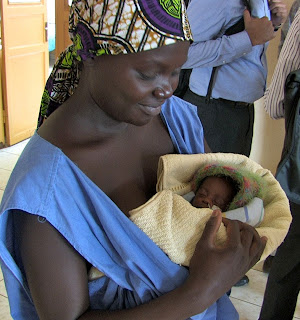Kigali, Rwanda (March 4 & 5, 2010) -- Morning meetings at regional hospitals and afternoon field trips to rural communities, one of them one of the poorest of Rwanda, characterized Friday's work for Rice MBAs who are working to commercialize Rice technology in Africa.
"I have seen poverty, but this was incredible," said Sharad Malhautra of the backpack team. "We drove out of Kigali on a paved road. Then we turned off road on to a rutted path. Finally we stopped and hiked for an hour to the village. The people there had little to eat. We saw a man who looked like he was dying and a little boy with serious infection on both legs."
Many villagers in remote areas suffer from infection, malaria, and lung diseases like TB.
Despite claims by the Rwandan government that every village has a community health volunteer, villagers in this community told Malhautra they had never seen a health volunteer.
CPAP and IV Drip Monitor Big Hits with Doctors
Meantime in Kigali on Friday morning the SmartDrip IV Drip monitor and "Baby Bubbles" CPAP device both received enthusiastic approval from doctors at University Central Hospital of Kigali ("CHK" or "Chuck" as its called by locals), the second largest hospital in Rwanda.
Of all the Rice medical devices, the IV "SmartDrip" device consistently met with enthusiastic reception. It's portability, ease-of-use, and low cost make it a winner to doctors and nurses who currently pay top dollars for comparable devices. Doctors want the SmartDrip now.
The CPAP controlled air pressure device which is designed to inflate newborn's lungs when they have difficulty breathing was also popular, but doctors wanted to see the device modified to use oxygen as well.
Hospitals were less enthusiastic about the backpack and c-clamp dosing devices, although the backpack was popular with community health clinics and in rural areas (like the one mentioned above at the beginning of this posting).
Rwandan health officials had the most reservations about the c-clamp device that regulates the amount of medicine that can administered from one dosing syringe. Health workers were concerned about the clamp being sold apart from a dosing syringe. Some nurses expressed concerned about cleanliness of any kind of reusable dosing device. Although currently, most Rwandans re-use spoons or dosing cups to give medication to their children, an unsanitary practice, especially in villages where clean water is rare.
Power, Water, Remote Regions, Maintenance
(Saturday morning, March 6, over breakfast, Hotel Gorillas) -- Dr. Jeffrey Rose, MD, of Ascension Health told the MBA teams that despite great improvements in health care, Rwanda still faces incredible infrastructure challenges -- non existent or unreliable power, untreated water in rural districts, and non-existent or poor roads.
"But beyond the problems with infrastructure, Rwanda needs a plan for maintaining the medical equipment it has," said Rose, whose organization gathers and refurbishes donated medical equipment only to see it break down and never be fixed. "Maintenance is a huge problem for any medical community, but in Rwanda the problem is worse because there are no trained maintenance people to work on equipment."
Rose challenged students to develop business models for a countrywide solution to its maintenance deficit.
The MBAs will spend the rest of spring term developing their business plans for each of their products.













